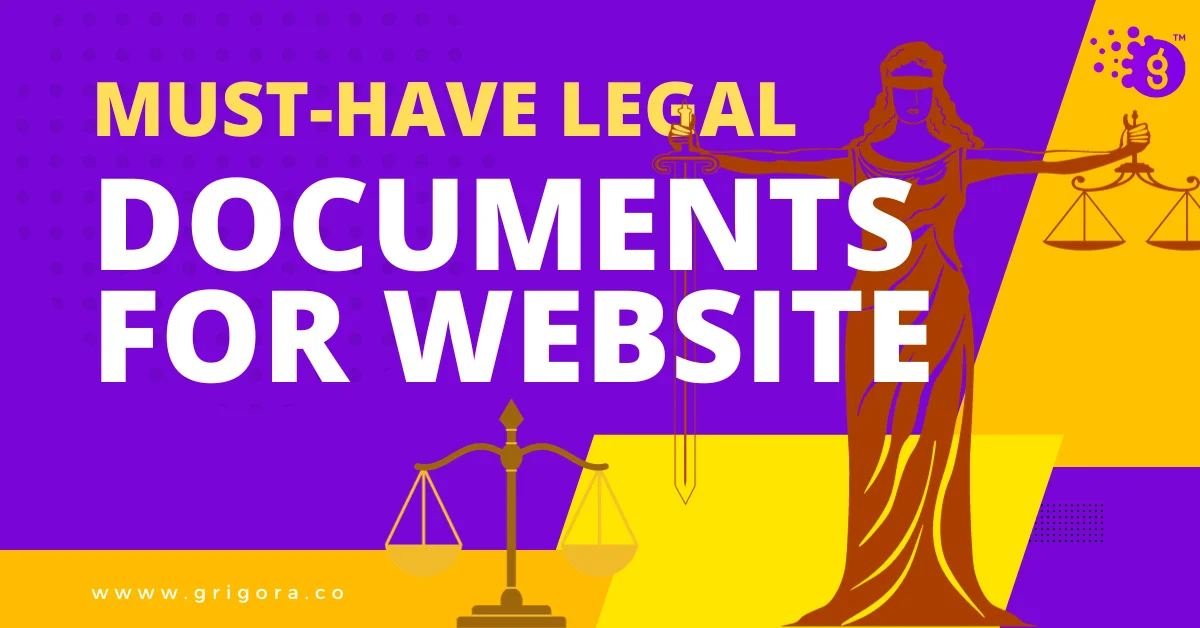Introduction
"Ignorance of the law is no excuse for breaking it."
The Importance of Legal Documents on a Website
In today's digital age, having a website is almost a necessity for anyone who wants to engage in business, offer services, or simply showcase their portfolio. However, owning a website comes with its own set of legal responsibilities. Legal documents are not just a formality; they are a crucial aspect of your website that can protect you from potential legal disputes and liabilities.
Consequences of Not Having Necessary Legal Documents
The absence of essential legal documents can lead to a myriad of problems. You could face legal actions, fines, or even the shutdown of your website. Not having the required legal documents is a risk that no website owner should take.
9 Essential Legal Documents Every Website Owner Should Have
Privacy Policy: This document outlines how your website collects, uses, and manages user data. It's essential for building trust and complying with privacy laws like GDPR.
Terms and Conditions: This sets the rules and guidelines that users must agree to in order to use your website. It's crucial for limiting your liability and defining user responsibilities.
Disclaimer: This legal notice limits your liability concerning the accuracy or applicability of your website's content. It's particularly important for websites that provide advice or information.
Cookie Policy: This explains how your website uses cookies to track user behavior. It's required by EU law to obtain user consent before collecting this data.
Copyright Notice: This statement protects your website's content from unauthorized use. It usually includes the copyright symbol, the year of publication, and the owner's name.
User Agreement: This contract defines the relationship between you and your website's users, outlining what is expected from both parties. It's often used on platforms where users can post their own content.
Return and Refund Policy: This is crucial for e-commerce websites, outlining the rules for returning purchased items and getting refunds. It helps to build trust and clarify the process for unsatisfied customers.
Accessibility Statement: This document outlines your commitment to making your website accessible to all users, including those with disabilities. It may be required by law in some jurisdictions.
Data Protection and GDPR Compliance: This is an extension of your Privacy Policy, specifically addressing how you comply with the General Data Protection Regulation (GDPR) if you have EU visitors.
Having these documents in place not only ensures legal compliance but also builds credibility and trust with your website visitors.
Privacy Policy
What Is a Privacy Policy and Why It's Essential
A Privacy Policy is a legal document that outlines how a website collects, uses, and manages users' personal information. In many jurisdictions, having a Privacy Policy is not just good practice, it's a legal requirement. This document is essential for building trust with your users and for compliance with privacy laws such as GDPR (General Data Protection Regulation) and CCPA (California Consumer Privacy Act).
Key Components of a Privacy Policy
A comprehensive Privacy Policy should include information on data collection methods, types of data collected, how the data is used, and third-party sharing, among other things. It's crucial to be transparent and clear in your Privacy Policy to avoid any legal complications.
Terms and Conditions
Understanding the Role of Terms and Conditions
Terms and Conditions, often referred to as Terms of Service or User Agreements, serve as a legal contract between the website owner and the users. This document sets the rules, guidelines, and requirements that users must agree to in order to use your website.
What to Include in Your Terms and Conditions
The content of this document can vary depending on the nature of the website and the services it offers. However, common elements often include limitations of liability, user responsibilities, copyright information, and dispute resolution methods. Having a well-drafted Terms and Conditions can protect you from legal disputes and clarify the rules, terms and guidelines of using your website.
Disclaimer
Purpose and Importance of a Website Disclaimer
A disclaimer is a legal statement that aims to limit the website owner's liability for certain outcomes that might arise from the use of the website. It's a way to protect yourself from legal claims and clarify that users are responsible for how they interact with the website.
Types of Disclaimers and Their Uses
There are various types of disclaimers, such as legal, health, investment, and general disclaimers. The type you'll need depends on the content and services your website provides. For instance, if your website offers health advice, a specific health disclaimer stating that the content is not a substitute for professional medical advice is crucial. It's essential to tailor your disclaimers to your website's unique needs and risks.
Cookie Policy
What Are Cookies and Why a Policy Is Needed
Cookies are small text files stored on a user's device when they visit a website. They are used for various purposes, such as tracking user behavior and preferences. Having a Cookie Policy is not just good practice; it's a legal requirement in many jurisdictions, especially in the European Union under the GDPR.
How to Draft a Cookie Policy
Drafting a Cookie Policy involves outlining how your website uses cookies, the types of cookies used, and how users can control or opt out of cookie tracking. It's crucial to be transparent and clear in your Cookie Policy to build trust with your website visitors. If you're unsure about how to draft a comprehensive Cookie Policy, Grigora offers features that can simplify this process, ensuring that you remain compliant with legal standards.
Copyright Notice
Protecting Your Website Content
Copyright Notice serves as a public declaration that the content on your website is your intellectual property. This includes text, images, videos, and other forms of media. A Copyright Notice typically includes the copyright symbol, the year of publication, and the name of the copyright owner.
How to Write and Display a Copyright Notice
Creating a Copyright Notice is relatively straightforward. It usually consists of the copyright symbol (©), the year the content was created or published, and the name of the copyright owner. For example: "© 2023 Your Name or Company Name."
Display the Copyright Notice prominently, usually in the footer of your website, so it's visible on all pages. This acts as a deterrent to potential infringers and provides a basis for legal action if someone does infringe on your copyrighted material.
User Agreement
Defining the Relationship Between You and the User
A User Agreement, also known as Terms of Service or Terms of Use, is a legal document that outlines the rules, terms, and guidelines that users must agree to in order to use your website or app. This agreement serves as a legal contract between you and your users and can protect you from potential liabilities.
Key Clauses in a User Agreement
When drafting a User Agreement, it's crucial to include several key clauses, such as:
User Responsibilities: Clearly state what is expected from the users.
Limitation of Liability: Limit your liability in cases of user misuse or unforeseen outages.
Dispute Resolution: Specify how disputes will be resolved, often through arbitration rather than court trials.
Termination Clause: Explain the conditions under which a user account may be terminated.
Grigora offers a feature that allows you to easily manage and update your User Agreement, ensuring that you remain compliant with any legal changes or requirements.
Return and Refund Policy
Why You Need a Clear Return and Refund Policy
Having a clear and concise Return and Refund Policy is not just good business practice; it's also a legal requirement in many jurisdictions. This policy outlines the conditions under which customers can return products and receive refunds, thereby enhancing consumer trust and satisfaction.
What to Include in This Policy
When creating your Return and Refund Policy, consider including the following key points:
Eligibility Criteria: Specify the conditions that must be met for a return or refund.
Time Frame: Indicate the time period within which returns or refunds must be requested and processed.
Return Process: Provide a step-by-step guide on how customers can return products.
Refund Method: State whether refunds will be given as store credit, replacements, or money back.
Grigora's platform can help you manage your Return and Refund Policy efficiently, ensuring that it is easily accessible and up-to-date, which is crucial for maintaining customer trust and legal compliance.
Accessibility Statement
Legal Requirements for Website Accessibility
In an increasingly digital world, ensuring that your website is accessible to all, including those with disabilities, is not just an ethical obligation but often a legal one as well. Various countries have laws and regulations that require websites to be accessible to people with disabilities. For instance, in the United States, the Americans with Disabilities Act (ADA) sets guidelines for website accessibility.
Creating an Accessibility Statement
Your Accessibility Statement should include:
Scope of Compliance: Outline the standards or guidelines you are following, such as WCAG 2.1.
Features: List the accessibility features your website offers, like keyboard navigation or alternative text for images.
Contact Information: Provide a way for users to report accessibility issues or seek assistance.
Data Protection and GDPR Compliance
Understanding GDPR and Data Protection Laws
Data protection has become a critical concern for both users and website owners. With the advent of the General Data Protection Regulation (GDPR) in the European Union, the stakes for data protection have been raised globally. GDPR not only applies to businesses operating within the EU but also to those that have EU citizens as customers.
Steps for GDPR Compliance
To ensure that your website is GDPR compliant, you should:
Data Mapping: Know where all personal data is stored and how it moves through your systems.
Privacy Policy Updates: Make sure your Privacy Policy is GDPR compliant.
Consent Mechanisms: Implement clear and easily accessible mechanisms for users to give or withdraw consent for data collection.
Data Protection Officer: Appoint a Data Protection Officer if your organization is large enough to warrant it.
Legal Requirements for E-commerce Websites
Additional Legal Documents for Online Stores
E-commerce websites have their own set of legal requirements that go beyond standard websites. These can include specific terms and conditions related to transactions, shipping policies, and consumer rights. For instance, you may need to include a detailed return and refund policy that complies with consumer protection laws.
Consumer Protection Laws to Consider
Consumer protection laws vary by jurisdiction but generally include:
Right to Cancel: Customers usually have a right to cancel orders within a specific time frame.
Warranty Information: Any warranties or guarantees must be clearly stated.
Shipping Policies: Estimated shipping times and costs should be transparent.
Managing Legal Documents with Grigora
Why Grigora is an Ideal Choice for Managing Legal Documents
Managing legal documents can be a cumbersome task, but it's made easier with Grigora. Grigora offers a user-friendly interface that allows you to easily upload, edit, and manage all your legal documents in one place. This is particularly useful for e-commerce websites that require a multitude of legal documents.
How to Create These Legal Documents
DIY vs. Hiring a Legal Professional
Creating legal documents for your website is a critical task that you can either do yourself or outsource to a legal professional. If you opt for DIY, there are various online tools and templates available that can guide you. However, these may not cover all the specific legal requirements for your website.
Online Tools and Templates
There are numerous online resources that offer free or paid templates for common legal documents. These can be a good starting point but remember that they are generic and may not fully comply with your local laws or specific business needs.
FAQs
Do I need all these legal documents?
The necessity of each legal document depends on the nature of your website and the jurisdiction in which you operate. However, it's generally advisable to have at least a Privacy Policy and Terms and Conditions to protect both you and your users.
How often should I update my legal documents?
Legal documents should be reviewed and updated at least annually. However, if there are significant changes in law or your business operations, immediate updates may be required.
What if my website is accessible globally?
If your website can be accessed from multiple countries, you may need to comply with international laws and regulations. This often means having multi-language versions of your legal documents and adhering to data protection laws from different jurisdictions.
Can I use templates for legal documents?
Yes, templates can serve as a starting point, but they should be customized to fit your specific needs and reviewed by a legal professional to ensure full compliance.
How can Grigora assist in managing my website's legal documents?
Grigora offers a robust platform for managing content, including legal documents. Its user-friendly interface and customization options make it easy to update and display your legal documents, ensuring that you remain compliant with the latest laws and regulations.
Conclusion
The Legal Health of Your Website Is Crucial
The legal health of your website is not something to be taken lightly. Failing to comply with legal requirements can result in fines, legal action, and a damaged reputation. Therefore, it's crucial to regularly update your legal documents to reflect any changes in the law or your business practices.
Regularly Update Your Legal Documents
It's not enough to just set up your legal documents once and forget about them. Laws and regulations change, and your website will likely evolve as well. Regular updates are essential to stay compliant.
Additional Resources
Books on Internet Law and Online Business
For those who want to delve deeper into the legal aspects of running a website, there are numerous books available on Internet law and online business. These books offer comprehensive insights into everything from copyright law to data protection.
Online Courses on Website Legal Requirements
Online courses can be a more interactive way to understand the legal requirements for your website. Platforms like Coursera, Udemy, and LinkedIn Learning offer courses on this topic, often taught by legal experts.
Forums and Communities for Website Owners
Joining online forums and communities can provide you with peer support and advice. These platforms often have threads discussing legal issues, where you can learn from the experiences of other website owners.



